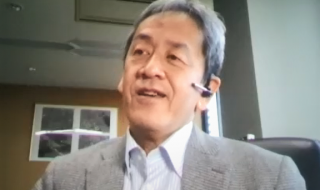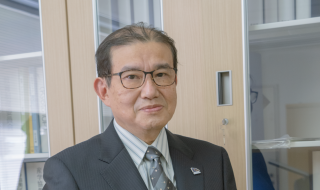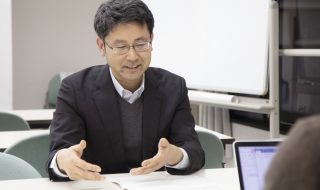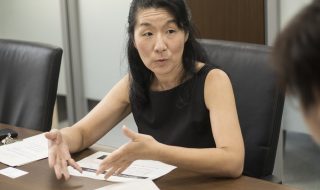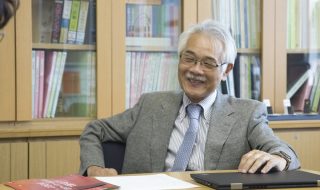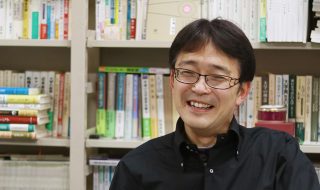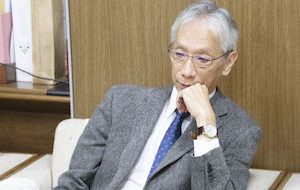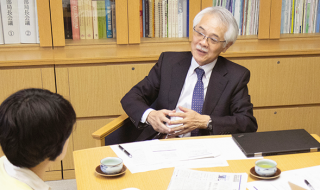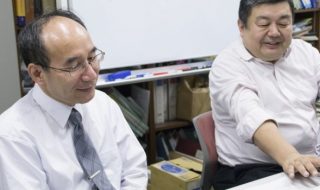The Graduate School and Faculty of Education has set up a COVID-19 response working group to tackle the challenges posed by the COVID-19 pandemic. They have been working systematically toward the implementation of online classes and providing support for newly enrolled students. In this interview, we invite Dr. Okabe to talk about his experience in building an online class support system as the Chair of the Academic Information Maintenance Committee.
SHARING A SENSE OF URGENCY AND ESTABLISHING A SUPPORT SYSTEM
When the COVID-19 pandemic started to escalate and the need for digital transformation in higher education increased significantly, what frameworks were considered at the Graduate School of Education and what areas were addressed in response to the crisis?
In the beginning, a COVID-19 response working group (hereafter referred to as the WG) was formed on March 13 to set up a support framework, and the first meeting was immediately held. The members of the WG include Dean and Vice-Dean of the Graduate School, Chairs of the Academic and Student Affairs Committees, Chair of the Education System Committee, Administrative Director, and some administrative staff. From the second meeting, I joined the WG as Chair of the Academic Information Management Committee, together with an assistant professor in charge of information technology within the graduate school. The well-balanced mix of WG members, who are from different departments as well as those involved in academic affairs, contributed significantly to the facilitation of our decision-making process on COVID-19 countermeasures. As the situation surrounding the pandemic was constantly evolving, we had to work closely and analyze each situation from different perspectives.
March was a hectic month for us. In early March, when the shift to online classes was becoming a more realistic option, Kyoto University was still considering face-to-face classes for the spring semester starting in April. Based on the policy, the first WG agenda was to discuss how to conduct face-to-face classes safely by practicing COVID-19 preventive measures. From the second meeting onward, however, a higher possibility of classes moving online was emerging, thus we all agreed that we should shift our focus to preparing for the implementation of online classes. Fortunately, I had used PandA and Zoom before, so I could easily imagine what an online class would look like.
By late March, “how to convince faculty members of the impending situation” was the center of discussion among the WG members. On March 26, we held our first Zoom trial session to demonstrate the utility of Zoom for the faculty members’ reference. On March 28, our first email newsletter was sent to inform the lineup of our online support services, such as PandA, upcoming Zoom training sessions, and the “Teaching Online” website, which is a class support site launched by the Center for the Promotion of Excellence in Higher Education. A series of email newsletters, including the latest 35th one, have been sent ever since.
The purpose of the email newsletter was initially to announce upcoming workshops, but from the 3rd newsletter sent on March 29, we started to write newsletters in a rather serious tone to encourage faculty members to participate in the workshops. Actually, March 29 was the day when a group infection was reported at Kyoto Sangyo University, which made us think more seriously about the responsibility of WG members.
So the WG started by injecting a sense of urgency into faculty members. In order to implement online classes, what problems did you anticipate that the faculty members of the graduate school would face, and what strategies were prepared to handle such anticipated problems?
We first anticipated that many of the faculty members would not be familiar with PandA and Zoom, two of the major platforms they would utilize for their online classes. So we set our priority to teach them what PandA did and how Zoom worked.
To that end, we moved on to organize some workshops within the Faculty of Education, aside from the ones held for the entire university faculties. We also agreed to hire some ICT support staff, who are graduate students who assist in creating course sites on PandA and giving some advice on how to use Zoom.
It was already in our discussion from early March that we should hire some graduate students as TAs and train them about PandA and Zoom, so they can assist faculty members who need immediate technical support. The graduate school has one assistant professor who is in charge of information technology, but we anticipated that he might receive a flood of inquiries about online classes. To back up the technical support system, the WG hired some graduate students and trained them to become ICT support staff. As initial training, the support staff participated in two 90-minute workshops in April and learned the basic functions of PandA and Zoom. At the same time, we asked faculty members if they had any concerns, including whether they would require ICT support or not, and if they did, we asked them to specify in what areas they needed assistance. By doing so, we could match up with appropriate support staff for their individual problems. We followed up by email on such issues that the ICT support staff couldn’t handle. All in all, everything went pretty well, and faculty members could prepare for online classes with the technical assistance of ICT support staff.
What do you do with the information you have accumulated through your support service?
Unfortunately, we didn’t save our records at first, but by June, we came to see what kind of problems faculty members often encountered in general. Since then, a support site was created on PandA for the faculty members of the Graduate School of Engineering, where useful information is compiled in a systematic way. We pick up some of the frequently asked questions and answers, as well as the information we included our newsletters, and post them on the support site. The site is managed in collaboration with Dr. Kutomi who is in charge of information technology of our graduate school.
STUDENT SUPPORT
Could you elaborate on the student support services that the Faculty of Education offered?
Student support, especially support for first-year students, was also on the table among the WG members from early on. With this year’s enrollment ceremony cancelled and the orientation for new students held online, first-year students started their academic life without a chance to know what it was like to be on campus. Some of them voiced their concerns that they were not given guidance on how to take university classes, and that they had no opportunities to make new friends. In response to their voices, we opened a new site on PandA dedicated to newly enrolled students. All first-year students were registered on the site and were encouraged to network with their peers through the chat room and forum functions. On April 27, a virtual get-together meeting was held on Zoom. From there onward, we started a more regular online event series called “Introduction of Faculties and Laboratories.” The Center of Collaboration in Innovation and Educational Practice takes the lead in organizing this event series, featuring faculties and laboratories to introduce themselves either during lunch hours or in the fifth period. The event series was held 18 times in total. Most of the sessions were well attended by students, except a few that did not have so many students showing up. First-year students seem particularly excited to listen to research-related topics.
EFFECTS OF ONLINE CLASSES
The COVID-19 pandemic forced all faculty members to convert their classes online. What are their reactions to teaching online classes?
Well, I think their overall reaction was pretty positive as they came to realize that they could get a lot of things done in online classes. I myself felt the same way, too. And as far as the students around me are concerned, I don’t think online classes are that bad for students. Nevertheless, I am not in a position to comment on the effectiveness of online classes, as further investigation and research are needed.
By the same token, we have been discussing how we should evaluate students’ performance from online classes, which has remained an unsolved issue. In my own case, I used to measure students’ level of achievement through their scores in periodic exams, but I couldn’t do so online. Instead, I gave an in-class writing assignment for 10 minutes in every online class. I wasn’t so sure, though, whether the writing assignments were as equally effective as exam scores to measure students’ level of achievement. I guess many other faculties have encountered the same issue. In either way, we should collect more evidence to verify the accuracy of evaluation methods taken through online classes.
FUTURE PLANS
This year, all classes were switched to online as a COVID-19 control measure. What will the future of online classes look like at the Graduate School of Engineering?
We had no other choice but to teach online as an emergency measure this year. On the flip side, however, the COVID-19 crisis and our swift move to online classes serve us as a reminder that we should reimagine the future of higher education. To be more precise, there must be many variations available in online class design and pedagogies, ideas for group activities, student assessment methods, and such, but under the emergent situation this time, we couldn’t allow enough time to design online classes by considering these valuable aspects.
I still remember vividly the time when the WG was formed in March. Back then, what we had in our mind was our core mission: keep the momentum of education and research going. We are still in the middle of the mission, which now I believe is broadly shared by all the faculty and administrative members of the graduate school. We anticipate that the COVID-19 pandemic will continue to affect our teaching and students’ academic lives for the foreseeable future, so the WG members meet at least once a month and discuss mental health issues and challenges faced by students and researchers. Though the light at the end of the tunnel is yet to be seen, we will always keep our mission in mind and seek the best solution to cope with the ever-evolving COVID-19 situation.
List of Interviews



